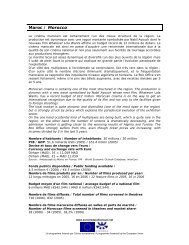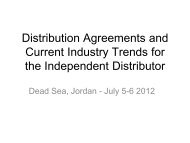programme - Euromed Audiovisuel
programme - Euromed Audiovisuel
programme - Euromed Audiovisuel
You also want an ePaper? Increase the reach of your titles
YUMPU automatically turns print PDFs into web optimized ePapers that Google loves.
Vivez Vivez le le rêve rêve arabe arabe cet cet automne automne à Bruxelles Bruxelles<br />
Live Live the the Arab Arab dream dream this this fall fall in in Brussels Brussels<br />
1 st - 28 th November<br />
1 er - 28 novembre<br />
A <strong>programme</strong> <strong>programme</strong> funded funded by the European European Union Union
2<br />
A <strong>programme</strong> funded by the European Union<br />
www.euromedaudiovisuel.net<br />
<strong>Euromed</strong> Audiovisual III is a <strong>programme</strong> of the European Union which aims to encourage the development<br />
of the film and audiovisual sectors in ten South Mediterranean countries: Algeria, Egypt,<br />
Israel, Jordan, Lebanon, Libya, Morocco, Syria, Occupied Palestinian Territories and Tunisia. The <strong>programme</strong><br />
finances six projects:<br />
ACCESS to markets in the digital era - A training project in the fields of funding, marketing, distribution<br />
and audiovisual policies<br />
DIA SUD MED - Cross media training project, based on the partnership of three film schools specialised<br />
in the areas of the audiovisual, arts and multimedia<br />
DOCmed - Training project designed for Arab professionals in the documentary field and holding a<br />
specific project for international coproduction<br />
Greenhouse - Training project supporting the production of documentary films, specifically targeting<br />
graduates of Mediterranean schools and their emerging filmmakers<br />
Med Film Factory - Training project aimed at teams of Arab producers and directors working on<br />
their first or second feature film<br />
Terramed Plus - Cooperation project between six broadcasters of the Euro-Mediterranean region,<br />
aimed towards the creation of a weekly magazine and a video on demand platform<br />
The <strong>Euromed</strong> Audiovisual <strong>programme</strong> has implemented a Capacity Development Unit, “Strategic<br />
Partnership”, aiming to improve networking of the audiovisual industry at regional level and encourage<br />
the cooperation among professionals of the sector.
www.euromedaudiovisuel.net<br />
A <strong>programme</strong> funded by the European Union 3<br />
<strong>Euromed</strong> <strong>Audiovisuel</strong> est un <strong>programme</strong> de l'Union européenne dont l'objectif est d´encourager le développement<br />
du cinéma et de l´audiovisuel dans dix pays du sud de la Méditerranée: Algérie, Égypte, Israël,<br />
Jordanie, Liban, Libye , Maroc, Syrie, Territoires palestiniens occupées et Tunisie. Le <strong>programme</strong> co-finance<br />
six projets:<br />
ACCESS - Accès aux marchés à l'ère numérique, projet de formation dans les domaines du financement,<br />
du marketing, de la distribution et de la législation audiovisuelle<br />
DIA SUD MED, projet de formation au cross média, basé sur le partenariat de trois écoles de cinéma spécialisées<br />
dans les domaines de l'audiovisuel, des arts et du multimédia<br />
DOCmed, projet de formation destiné aux professionnels arabes du secteur documentaire et porteurs<br />
d'un projet de coproduction internationale<br />
Greenhouse, projet de formation soutenant la production et la réalisation de films documentaires et visant<br />
les diplômés d’écoles méditerranéennes et les cinéastes émergents<br />
Med Film Factory, projet de formation qui s'adresse à des équipes de réalisateurs et de producteurs<br />
arabes travaillant sur leur premier ou deuxième projet de long métrage<br />
Terramed Plus, projet de coopération entre six télévisions de la région euro-méditerranéenne, visant à la<br />
création d'une émission hebdomadaire et d'une plateforme de Vidéo à la demande<br />
Le <strong>programme</strong> <strong>Euromed</strong> <strong>Audiovisuel</strong> a en outre mis en place une Unité de Développement des Capacités<br />
(cdsu), le “Partenariat Stratégique” dont le but est de contribuer à améliorer la mise en réseau<br />
de l'industrie audiovisuelle au niveau régional et faciliter la coopération entre opérateurs du secteur.
4<br />
A <strong>programme</strong> funded by the European Union<br />
Editorial<br />
Throughout the month of November, the European Commission’s <strong>Euromed</strong> Audiovisual<br />
<strong>programme</strong> (DG EuropeAid) is organising a series of film screenings and debates to reflect current<br />
upheavals in the Arab world, in partnership with the European Parliament, the Bozar, the<br />
Halles de Schaerbeek, and the Brussels Mediterranean Film Festival.<br />
The <strong>programme</strong> aims to reflect daring cinema that seeks to find itself beyond the revolutions<br />
and all that they have engendered.<br />
As the Arab Spring continues with all its hopes, contradictions, and uncertainties, something<br />
new has emerged beside the more conventional films: the creative diversity of youth who are<br />
less scared to film what they are saying, whom they are, and what they are living through. Independent<br />
productions have increased in number, as have films about democracy, human<br />
rights, hopes, and revolution (dis)illusions.<br />
Throughout November, a high-calibre and diverse selection of films will be complemented by<br />
meetings with many of their directors as well as numerous debates.<br />
Finally, this month dedicated to South Mediterranean cinema is to wrap up with a debate at the<br />
European Parliament about its potential as a driving force for democracy and economic growth<br />
“Images of Revolutions, Revolution in Images”<br />
Le <strong>programme</strong> <strong>Euromed</strong> <strong>Audiovisuel</strong> de la Commission européenne (DG EuropeAid)<br />
organise, tout au long du mois de novembre, une série de projections et débats sous le signe<br />
des bouleversements dans le monde arabe, en collaboration avec le Parlement européen, Bozar,<br />
les Halles de Schaerbeek et le Festival de Cinéma Méditerranéen de Bruxelles.<br />
La programmation se veut le reflet d’un cinéma audacieux qui se cherche au-delà des révolutions<br />
et de tout ce qu’elles ont généré.<br />
Le Printemps arabe suit son cours avec son lot d’espoirs, ses contradictions, ses incertitudes<br />
et ses questionnements. Aux côtés d’un cinéma classique, émerge une diversité créative d’une<br />
jeunesse qui a moins peur de filmer ce qu’elle dit, ce qu’elle est, ce qu’elle vit. Le constat est<br />
là : un nombre croissant de productions indépendantes et une présence importante de films<br />
qui parlent de démocratie, droits de l’homme, espoirs et (dés)illusion des révolutions.<br />
Ce mois de novembre dédié au cinéma se clôturera avec un débat au Parlement européen sur<br />
le thème de « Images des Révolutions, Révolution en images ».<br />
Une programmation dense de par son contenu, riche en émotion à partager et à découvrir !<br />
<strong>Euromed</strong> Audiovisual - European Commission
A <strong>programme</strong> funded by the European Union 5<br />
Europe Supports Mediterranean Cinema<br />
The European Parliament has long been committed to promoting and defending cinema as a<br />
medium for debate. Through the LUX Prize, that I have overseen since 2009, the European<br />
Parliament supports the circulation of European cinematic works throughout the EU by providing<br />
awarded films with subtitles in the EU’s 23 official languages. Cinema can thus convert<br />
itself into a formidable tool of discovery and awareness raising of other cultures and become<br />
an ideal medium for debate and reflexion on Europe.<br />
The European Parliament has not remained insensitive to the current upheavals in the Arab<br />
world. As cinema is an excellent way to better understand these changes and bring context to<br />
this debate, I decided to actively support the <strong>Euromed</strong> Audiovisual initiative.<br />
With its selection of fiction and documentary films from a dozen of Mediterranean countries, this<br />
cinematic retrospective shows that Arab cinema has started its own revolution, with the arrival of<br />
a generation who were hungry for freedom even before peoples started taking to the streets. Arab<br />
revolutions did not take place in one spring. Filmmakers were often the precursors of a movement<br />
struggling against ossified societies riddled with corruption, alienation, and inertia of all kinds.<br />
Beyond cinema brilliantly reflecting emerging voices and thirst for democracy, it is also a formidable<br />
tool for economic development and job creation. Several members of the European<br />
Parliament and filmmakers are to meet on November 28 at the European Parliament to debate<br />
this exact topic and to think together about image and revolution, and how Europe can turn cinema<br />
into a driver of growth and democracy.<br />
Le Parlement européen est depuis longtemps engagé pour la promotion et la défense du cinéma<br />
comme vecteur de débat. A travers le Prix LUX, dont je m’occupe depuis 2009, le Parlement<br />
européen soutient la circulation des œuvres cinématographiques européennes au sein<br />
de l’UE en fournissant les sous-titrages des films primés dans les 23 langues officielles. Le cinéma<br />
peut ainsi se convertir en un formidable outil de découverte et de conscientisation d'autres<br />
cultures et devenir un véhicule idéal pour le débat et la réflexion sur l’Europe.<br />
Le Parlement européen ne peut être insensible aux bouleversements qui secouent les mondes arabes.<br />
Le cinéma étant un excellent moyen de mieux comprendre ces changements et d’apporter du<br />
débat, j’ai décidé d'activement supporter cette initiative du <strong>programme</strong> <strong>Euromed</strong> <strong>Audiovisuel</strong>.<br />
Présentant une sélection de fictions et documentaires, d’une douzaine de pays méditerranéens,<br />
cette rétrospective montre que le cinéma arabe a commencé sa révolution avec l’arrivée<br />
d’une génération avide de liberté, avant même que les peuples ne descendent dans la rue. Les<br />
révolutions arabes ne se sont pas faites en un printemps. Les cinéastes ont été souvent les précurseurs<br />
d’un mouvement luttant contre des sociétés figées et gangrenées par la corruption,<br />
l’aliénation et les pesanteurs de tout type.<br />
Si le cinéma reflète brillamment la parole qui se libère et la soif de démocratie, il constitue<br />
également un formidable outil de croissance économique et de source d’emplois. C’est justement<br />
autour de cette thématique que plusieurs députés européens et cinéastes se réunirons<br />
le 28 novembre au Parlement européen, pour réfléchir ensemble sur la manière dont l’Europe<br />
peut faire du cinéma un levier de croissance et de démocratie.<br />
Isabelle Durant,<br />
Vice-President of the European Parliament
6<br />
Thursday, November 1 - Centre for Fine Arts<br />
17:00 Thighir - Jerusalem : Les échos du Mellah<br />
by Kamal Hachkar (Morocco)<br />
In presence of the director<br />
20:00 Concert “The Med Orchestra”,<br />
Judeo-Moroccan melodies<br />
Thursday, November 8 - Centre for Fine Arts<br />
18:30 Nights of Silence by Reis Celik (Turkey)<br />
In presence of the director, and the actor<br />
Ilyas Salman<br />
20:30 Winter of Discontent by Ibrahim El Batout<br />
(Egypt)<br />
In presence of the actor and producer<br />
Amr Waked<br />
Friday, Novembre 9 - Centre for Fine Arts<br />
20:00 Magnifica Presenza by Ferzan Ozpetec (Italy)<br />
In presence of the director<br />
Followed by a cocktail opened to the public<br />
Saturday, November 10 - Botanique<br />
19:30 Death for Sale by Faouzi Ben Saïdi<br />
(Morocco/Belgium)<br />
21:15 Revolution 101 by Doron Tsabari & Ori<br />
Inbar (Israel)<br />
In presence of the directors<br />
Sunday, November 11 - Botanique<br />
17:00 My Land by Nabil Ayouch (Morocco)<br />
In presence of the director<br />
19:00 We Are Here by Abdallah Yahya (Tunisia)<br />
In presence of the director<br />
Followed by a debate on<br />
An “exciting but dangerous” transition<br />
19:15 Habibi by Susan Youssef (Palestine)<br />
20:00 God's Horses by Nabil Ayouch (Morocco)<br />
In presence of the director<br />
21:15 Même pas Mal by Nadia El-Fani & Alina<br />
Isabel Perez (Tunisia)<br />
In presence of the directors<br />
A <strong>programme</strong> funded by the European Union<br />
PROGRAMME<br />
Monday, November 12 - Botanique<br />
17:30 The Repentant by Merzak Allouache (Algeria)<br />
19:30 Sharqiya by Ami Livne<br />
(Israel/France/Germany)<br />
21:15 Cairo 678 by Mohamed Diab (Egypt)<br />
Tuesday, November 13 - Botanique<br />
19:00 Une Arme de Choix by Florence Tran (France)<br />
In presence of the director<br />
Followed by a debate on<br />
What is the role of filmmakers in a changing Arab<br />
world?<br />
21:15 The Virgin, the Copts and Me by Namir<br />
Abdel Messeeh (France/Qatar)<br />
In presence of the director<br />
Thursday, November 15 - Botanique<br />
21:30 God's Neighbours by Meni Yaesh<br />
(Israel, France)<br />
Friday, November 16 - Botanique<br />
17:00 God's Neighbours by Mani Yaesh<br />
(Israel, France)<br />
21:15 The Repentant by Merzak Allouache (Algeria)<br />
Saturday, November 17 - Botanique<br />
18:30 Habibi by Susan Youssef (Palestine)<br />
Tuesday , November 27 - Centre for Fine Arts<br />
20:30 It Was Better Tomorrow by Hinde Boujemaa<br />
(Tunisia)<br />
In presence of the director<br />
Wednesday, November 28 - European Parliament<br />
18:30 Winter of Discontent by Ibrahim El Batout<br />
(Egypt)<br />
To participate:<br />
brussels@euromedaudiovisuel.net<br />
In presence of the director and Amr Waked<br />
Followed by a debate on<br />
Images of Revolutions, Revolution in Images<br />
To participate: brussels@euromedaudiovisuel.net<br />
With Ibrahim El Batout, Amr Waked,<br />
Dora Bouchoucha, Hinde Boujemaa<br />
Vivez le rêve arabe cet automne à Bruxelles Live the Arab dream this fall in Brussels
Jeudi 1 er novembre - Palais des Beaux-Arts<br />
17:00 Thighir - Jerusalem : Les échos du Mellah<br />
de Kamal Hachkar (Maroc)<br />
En présence du réalisateur<br />
20:00 Concert “The Med Orchestra“,<br />
mélodies judéo-marocaines<br />
Jeudi 8 novembre - Palais des Beaux-Arts<br />
18:30 Nights of Silence de Reis Celik (Turquie)<br />
En présence du réalisateur et de l’acteur<br />
Ilyas Salman<br />
20:30 Winter of Discontent d’Ibrahim El Batout<br />
(Egypte)<br />
En présence de l’acteur et producteur<br />
Amr Waked<br />
Vendredi 9 novembre - Palais des Beaux-Arts<br />
20:00 Magnifica Presenza de Ferzan Ozpetec (Italie)<br />
En présence du réalisateur<br />
Suivi d’un cocktail ouvert au public<br />
Samedi 10 novembre - Botanique<br />
19:30 Mort à vendre de Faouzi Ben Saïdi<br />
(Maroc/Belgique)<br />
21:15 Revolution 101 de Doron Tsabari et Ori<br />
Inbar (Israël)<br />
En présence du réalisateur<br />
Dimanche 11 novembre - Botanique<br />
17:00 My Land de Nabil Ayouch (Maroc)<br />
En présence du réalisateur<br />
19:00 We Are Here de Abdallah Yahya (Tunisie)<br />
En présence du réalisateur<br />
Suivi d’un débat sur<br />
Une transition « exaltante mais périlleuse »<br />
19:15 Habibi de Susan Youssef (Palestine)<br />
20:00 Les Chevaux de Dieu de Nabil Ayouch (Maroc)<br />
En présence du réalisateur<br />
21:15 Même pas Mal de Nadia El-Fani et Alina<br />
Isabel Perez (Tunisie)<br />
En présence des réalisatrices<br />
A <strong>programme</strong> funded by the European Union<br />
PROGRAMME<br />
Lundi 12 novembre - Botanique<br />
17:30 Le Repenti de Merzak Allouache (Algérie)<br />
19:30 Sharqiya de Ami Livne<br />
(Israël/France/Allemagne)<br />
21:15 Les Femmes du bus 678 de Mohamed Diab<br />
(Egypte)<br />
Mardi 13 novembre - Botanique<br />
19:00 Une Arme de Choix de Florence Tran (France)<br />
En présence de la réalisatrice<br />
Suivi d’un débat sur<br />
Le monde en mutation : quel rôle pour les cinéastes ?<br />
21:15 La Vierge, les Coptes et Moi de Namir<br />
Abdel Messeeh (France/Qatar)<br />
En présence du réalisateur<br />
Jeudi 15 novembre - Botanique<br />
21:30 Les Voisins de Dieu de Meni Yaesh<br />
(Israël, France)<br />
Vendredi 16 novembre - Botanique<br />
17:00 Les Voisins de Dieu de Meni Yaesh<br />
(Israël, France)<br />
21:15 Le Repenti de Merzak Allouache (Algérie)<br />
Samedi 17 novembre - Botanique<br />
18:30 Habibi de Susan Youssef (Palestine)<br />
Mardi 27 novembre - Palais des Beaux-Arts<br />
20:30 C’était mieux demain de Hinde Boujemaa<br />
(Tunisie)<br />
En présence de la réalisatrice<br />
Mercredi 28 novembre - Parlement européen<br />
18:30 Winter of Discontent d’Ibrahim El Batout<br />
(Egypte)<br />
Pour participer :<br />
brussels@euromedaudiovisuel.net<br />
En présence du réalisateur et Amr Waked<br />
Suivi d’un débat sur<br />
Images des Révolutions, Révolution en images<br />
Pour participer : brussels@euromedaudiovisuel.net<br />
Avec Ibrahim El Batout, Amr Waked,<br />
Dora Bouchoucha, Hinde Boujemaa<br />
Vivez le rêve arabe cet automne à Bruxelles Live the Arab dream this fall in Brussels<br />
7
8<br />
A<br />
A <strong>programme</strong> funded by the European Union<br />
Morocco | 2012 | Drama | 82 min | Original version with subtitles<br />
Thinghir – Jerusalem: les echos du Mellah<br />
Kamal Hachkar<br />
The young French-Moroccan director Kamal Hachkar lives in<br />
France but was born in Tinghir in the Atlas Mountains, where a<br />
community of Berbers used to live in which Jews and Muslims<br />
were intermingled. He made a documentary in which he goes in<br />
search of his roots. In Israel he seeks out the Jews who left Tinghir<br />
in the late 1960s; there, he meets an older generation of Berbers<br />
and introduces us to their Jewish-Muslim singing, voices,<br />
and stories.<br />
Jeune réalisateur franco-marocain, Kamal Hachkar habite en France<br />
mais est né à Tinghir, dans la région montagneuse de l'Atlas, où<br />
juifs et musulmans vivaient côte à côte dans une communauté berbère.<br />
Il part à la recherche de ses racines, en Israël, à la recherche<br />
des juifs qui ont quitté Tinghir à la fin des années 60. Là, il rencontre<br />
cette vieille génération de Berbères et fait connaissance avec les<br />
chants, les voix et les histoires judéo-musulmans.<br />
Thursday/Jeudi 01/11 - 17:00 - Centre for Fine Arts<br />
In presence of the director / En présence du réalisateur<br />
Followed by a concert / Suivi par un concert : “MED Orchestra”,<br />
Moroccan-Jewish music patrimony<br />
Turkey | 2012 | Drama | 92 min | Original version with subtitles<br />
Nights of silence / Lal Gece<br />
Reis Celik<br />
It’s the story of a forced marriage, in Anatolia, between an older<br />
man and a younger woman. On the night of the wedding, the man<br />
finally discovers the face of his wife who, according to tradition,<br />
had remained veiled until then. He is stupified to discover that she<br />
is only 14 years old...<br />
C’est l’histoire d’un mariage forcé, en Anatolie, entre un homme<br />
d’un certain âge et une jeune femme. Le soir venu, l’homme découvre<br />
finalement le visage de son épouse qui, selon la tradition, se doit<br />
de garder son voile jusqu’à la nuit de noces. Stupéfaction, l’épouse<br />
est une jeune fille de 14 ans…<br />
Thursday/Jeudi 08/11 - 18:30 - Centre for Fine Arts<br />
In presence of the director and actor / En présence du réalisateur<br />
et de l’acteur Ilyas Salman<br />
Vivez le rêve arabe cet automne à Bruxelles Live the Arab dream this fall in Brussels
A <strong>programme</strong> funded by the European Union<br />
Egypt | 2012 | Drama | 96 min | Original version with subtitles<br />
Winter of discontent<br />
Ibrahim El Batout<br />
Winter of Discontent presents three characters whose lives are<br />
turned upside down by the Revolution of 25 January 2011.<br />
Shown at the Venice Film Festival, this feature film takes us back<br />
to the bloodiest moments of the Mubarak regime and helps us to<br />
understand why the fate of a nation was decided in Tahrir Square.<br />
Winter of Discontent met en scène trois personnages dont les<br />
vies seront bouleversées par la Révolution du 25 janvier 2011.<br />
Ce long métrage, présenté au Festival de Venise, nous replonge<br />
dans les heures les plus sanglantes du régime Moubarak et permet<br />
de mieux comprendre pourquoi le destin d’une nation a basculé<br />
à la place Tahrir.<br />
Wednesday/Mercredi 28/11 - 18:30 - European Parliament<br />
Followed by a debate on: “Image of Revolutions, Revolution in<br />
Images” with Ibrahim El Batout, Amr Waked, Dora Bouchoucha<br />
and Hinde Boujemaa<br />
Suivi d'un débat sur : “Image des Révolutions, Révolution en<br />
images” avec Ibrahim El Batout, Amr Waked, Dora Bouchoucha<br />
et Hinde Boujemaa<br />
Italy | 2012 | Comedy | 105 min | Original version with subtitles<br />
Magnifica presenza<br />
Ferzan Ozpetek<br />
Pietro is a young Sicilian baker who arrives in Rome dreaming of<br />
becoming an actor. After finding an enormous old house in Monteverde<br />
(a Rome neighbourhood) for a very good price, he realizes<br />
it is already occupied by strange characters in the form of a<br />
theatre troupe, which died in 1943 and remained confined within<br />
its walls.<br />
Pietro est un jeune boulanger sicilien qui arrive à Rome avec le<br />
rêve de devenir acteur. Après avoir trouvé une vieille et immense<br />
demeure à Monteverde (un quartier de Rome) pour un très bon<br />
prix, il se rend compte qu'elle est déjà occupée par d'étranges<br />
personnages : une troupe de théâtre, décédée en 1943 et restée<br />
enfermée dans ses murs.<br />
Friday/Vendredi 09/11 - 20:00 - Centre for Fine Arts<br />
Followed by a cocktail / Suivi d’un cocktail<br />
Vivez le rêve arabe cet automne à Bruxelles Live the Arab dream this fall in Brussels<br />
9
10<br />
A<br />
A <strong>programme</strong> funded by the European Union<br />
Belgium/France/Morocco | 2011 | Fiction | 117 min | Original ver-<br />
sion with subtitles<br />
Death for sale / Mort à vendre<br />
Faouzi Bensaidi<br />
Tetouan, the Atlantic port city in the north of Morocco. Three<br />
young men decide to rob a jewellery store. They are among the<br />
hopelessly unemployed street population of Morocco’s provincial<br />
cities, common thugs in the eyes of many but bound by solidarity<br />
and friendship.<br />
Trois copains, Malik, Allal et Soufiane, qui vivent de menus larcins<br />
dans la ville de Tétouan, décident de tenter un grand coup :<br />
le cambriolage de la grande bijouterie de la ville.<br />
Saturday/Samedi 10/11 - 19:30 - Botanique<br />
Israel | 2010 | Documentary | 85 min | Original version with subtitles<br />
Revolution 101<br />
Doron Tsabari & Ori Inbar<br />
A journey into the heart of Israel’s political and social reality, this<br />
docu-fiction is not only a guide to the “audiovisual revolution” that<br />
opens up possible paths for change, but also a film about the<br />
power of cinema as an actual vehicle for this change. In a lively<br />
and entertaining manner, it shows the director and his producer’s<br />
struggle to denounce Israeli public television’s shortcomings in<br />
order to restore it to its real owner: the public.<br />
Voyage au cœur de la réalité politique et sociale israélienne, ce film,<br />
sorte de docu-fiction est non seulement un guide de la « révolution<br />
audiovisuelle » qui expose les voies possibles de changement, mais<br />
aussi un film sur le pouvoir du cinéma comme vecteur même de ce<br />
changement. De manière vivante et amusante, il montre le combat<br />
du réalisateur et de son producteur pour dénoncer les dysfonctionnements<br />
de la télévision publique israélienne, afin de la restituer à<br />
son véritable « propriétaire » : le public lui-même.<br />
Saturday/Samedi 10/11 - 21:15 - Botanique<br />
Vivez le rêve arabe cet automne à Bruxelles Live the Arab dream this fall in Brussels
A <strong>programme</strong> funded by the European Union<br />
Morocco | 2011 | Documentary | 80 min | Original version with subtitles<br />
My land<br />
Nabil Ayouch<br />
This documentary gives the word to old Palestinian refugees who<br />
fled in 1948 without ever returning to their land, and have been living<br />
in camps in Lebanon for over 60 years. This word is heard by young<br />
Israelis of 20 years old, building their country, feeling deeply attached<br />
to their land, without ever really knowing why.<br />
My land donne la parole à de vieux réfugiés palestiniens qui ont fui<br />
en 1948 sans jamais retourner sur leur terre, et qui vivent dans des<br />
camps au Liban depuis plus de 60 ans. Cette parole est entendue<br />
par de jeunes israéliens de 20 ans qui construisent leurs pays, se<br />
sentent viscéralement attachés à leur terre, mais sans jamais vraiment<br />
savoir expliquer pourquoi. Entre ces deux mémoires, il y a une<br />
réalité. La réalité de deux peuples qui se battent pour la même terre.<br />
Il en ressort un dialogue à distance qui met en perspective ce conflit<br />
sous un angle avant tout humain.<br />
Sunday/Dimanche 11/11 - 17:00 - Botanique<br />
Followed by a discussion with the director / Suivi d’un rencontre<br />
avec le réalisateur<br />
Tunisia | 2012 | Documentary | 52 min | Original version with subtitles<br />
We are here<br />
Adallah Yahya<br />
We are here is a documentary about youth on a quest to overcome<br />
their dark reality and find positive energy. In one of Tunis’ popular<br />
neighbourhoods, a young group of Tunisian rappers try to make their<br />
voices heard through songs reflecting their daily suffering, while a<br />
group of students defy their routine by taking a citizens’ initiative...<br />
We are here est un film documentaire qui décrit la quête des jeunes<br />
qui veulent surmonter leurs sombre réalité afin de trouver l'énergie<br />
positive. Dans l'un des quartiers populaires de Tunis, un groupe de<br />
jeunes rappeurs Tunisiens essaye de faire entendre leurs voix à partir<br />
de chansons reflétant leur souffrance quotidienne. D'autre part<br />
un groupe d'élèves défient leurs quotidien en prenant une initiative<br />
citoyenne...<br />
Sunday/Dimanche 11/11 - 19:00 - Botanique<br />
Followed by a conference on An ‘exciting but dangerous’ transition<br />
Suivi par un débat sur Une transition ‘exaltante mais périlleuse’<br />
Vivez le rêve arabe cet automne à Bruxelles Live the Arab dream this fall in Brussels<br />
11
12<br />
A <strong>programme</strong> funded by the European Union<br />
Palestine/USA/Netherlands | 2011 | Drama | 77 min | Original version<br />
with subtitles<br />
Habibi / Mon Amour<br />
Susan Youssef<br />
Habibi is the story of a forbidden love that adapts the poems of the<br />
great poet Qays, written in the seventh century Arabia, to the present<br />
time. Two young students in the West Bank are forced to return<br />
home. In occupied territory, their love defies family traditions<br />
and Qays and Layla find themselves prisoners of the conventions<br />
of their own community.<br />
Inspiré d’une des légendes les plus populaires d’Orient, Habibi<br />
nous conte l’amour interdit de deux jeunes étudiants palestiniens.<br />
Qays et Layla, étudient sur la rive occidentale du Jourdain, mais<br />
sont forcés de retourner à Gaza où leur amour est interdit. Des<br />
graffiti apparaissent sur les murs de la ville : le moyen pour Qays<br />
de défier la tradition et de crier son amour pour Layla.<br />
Sunday/Dimanche 11/11 - 19:15 - Botanique<br />
Saturday/Samedi 17/11 - 18:30 - Botanique<br />
Morocco/France/Belgium | 2012 | Drama | 115 min | Original version<br />
with subtitles<br />
God's Horses / Les chevaux de Dieu<br />
Nabil Ayouch<br />
Yachine lives with his family in the slums of Casablanca.<br />
His father suffers from depression, one of his brothers is in the army,<br />
another is almost autistic and the third, Hamid, is the boss of the<br />
local neighbourhood and Yachine’s protector. When sent to jail, Yachine<br />
takes up jobs after jobs to get free from misery. Released from<br />
prison, Hamid persuades Yachine to join their “brothers”. The film is<br />
inspired by the terrorist attacks of May 16th 2003 in Casablanca.<br />
Yachine vit avec sa famille dans un bidonville à Casablanca. Un<br />
père dépressif, un frère à l’armée, un autre presque autiste et un troisième,<br />
Hamid, petit caïd du quartier et protecteur de Yachine. Lorsque<br />
Hamid se retrouve en prison, Yachine enchaîne les petits<br />
boulots pour sortir de ce marasme. Devenu islamiste radical pendant<br />
son incarcération Hamid persuade Yachine de rejoindre leurs<br />
“frères”. Ce film est librement inspiré des attentats terroristes du 16<br />
mai 2003 à Casablanca.<br />
Sunday/Dimanche 11/11 - 20:00 - Botanique<br />
Followed by a discussion with the director / Suivi d’une rencontre<br />
avec le réalisateur<br />
Vivez le rêve arabe cet automne à Bruxelles Live the Arab dream this fall in Brussels
A <strong>programme</strong> funded by the European Union<br />
Tunisia | 2012 | Documentary | 66 min | Original version with subtitles<br />
Même pas Mal<br />
Nadia El-Fani et Alina Isabel Perez<br />
A documentary that draws a parallel between Nadia El Fani’s film<br />
“Laicité Inch'Allah!” and her struggle against cancer and the Islamists.<br />
This documentary follows Nadia from the time that she started<br />
making the documentary “Laicité Inch'Allah!” until its release in<br />
cinemas, and thus retraces all her struggles and revolutions over the<br />
course of more than a year... and the fight goes on!<br />
Un documentaire qui fait un parallèle entre le film "Laicité Inch'Allah !"<br />
de Nadia El Fani et le combat que la réalisatrice a mené contre son<br />
cancer et les islamistes. Ce documentaire suit Nadia à partir du moment<br />
où elle a commencé à réaliser le documentaire "Laicité Inch'Allah<br />
!" jusqu'à la sortie en salles du film et retrace ainsi tous les<br />
combats et les révolutions qu'elle a menées dans sa vie pendant plus<br />
d'1 an... et le combat continue!<br />
Sunday/Dimanche 11/11 - 21:15 - Botanique<br />
Followed by a discussion with the directors / Suivi d’une rencontre<br />
avec les réalisatrices<br />
Egypt | 2011 | Drama | 100 min | Original version with subtitles<br />
Cairo 678 / Les femmes du bus 678<br />
Mohamed Diab<br />
Fayza is a housewife steeped in traditional values who seeks justice.<br />
Seba is a rich jewelry designer who is trying to recover from<br />
a vicious physical attack. Nelly is a young promising actress who<br />
provokes indignation for filing a lawsuit for sexual harassment.<br />
The film powerfully portrays three Egyptian women with different<br />
lives, who unite together to fight machismo.<br />
Fayza est une mère de famille pétrie de valeurs traditionnelles qui<br />
réclame justice. Seba est une riche créatrice de bijoux qui tente de<br />
se remettre d’une agression collective particulièrement vicieuse.<br />
Nelly, une comédienne prometteuse, soulève l’indignation générale<br />
pour avoir osé déposer plainte pour harcèlement sexuel. Toutes<br />
trois déçues par la nonchalance des autorités, elles décident<br />
de combattre le machisme agressif et impuni qui sévit au Caire<br />
dans les rues, dans les bus et dans leurs maisons. Déterminées,<br />
elles vont dorénavant humilier ceux qui les humiliaient.<br />
Monday/Lundi 12/11 - 21:15 – Botanique<br />
Vivez le rêve arabe cet automne à Bruxelles Live the Arab dream this fall in Brussels<br />
13
14<br />
A <strong>programme</strong> funded by the European Union<br />
Algeria/France | 2012 | Drama | 87 min | Original version with subtitles<br />
The Repentant / Le repenti<br />
Merzak Allouache<br />
Algeria, in the region of the highlands. As Islamist groups continue<br />
to spread terror, Rashid, a young jihadist, leaves the mountains to return<br />
to his village. In keeping with the law of “pardon and national<br />
harmony”, he has to surrender to the police and give up his weapon.<br />
He thus receives amnesty and becomes a “repenti”. But the law<br />
cannot erase his crimes and for Rachid it's the beginning of a oneway<br />
journey of violence, secrets, and manipulation.<br />
Algérie, région des hauts plateaux. Alors que des groupes d'irréductibles<br />
islamistes continuent à semer la terreur, Rachid, un<br />
jeune jihadiste, quitte la montagne et regagne son village. Selon<br />
la loi de « pardon et de concorde nationale », il doit se rendre à la<br />
police et restituer son arme. Il bénéficie alors d'une amnistie et<br />
devient « repenti ». Mais la loi ne peut effacer les crimes et pour<br />
Rachid s'engage un voyage sans issue où s'enchevêtrent la violence,<br />
le secret, la manipulation.<br />
Monday/Lundi 12/11 - 17:30 - Botanique<br />
Friday/Vendredi 16/11 - 21:15 - Botanique<br />
Israel | 2012 | Drama | 82 min | Original version with subtitles<br />
Sharqiya<br />
Ami Livne<br />
Kamel Najer is Bedouin. He works as a security guard at the Be’er<br />
Sheba’s central bus station. He lives in a small illegal village in the<br />
middle of the desert. One day, he returns to home to be told that the<br />
authorities have ordered his village to be pulled down. The next day,<br />
his brother Khaled, the village leader, quits his job and decides to stay<br />
in the village to push back any authorities who might try to throw<br />
them out of their homes. As for Kamel, he sets off to work determined<br />
to draw attention to the problems of the Bedouin minority...<br />
Kamel, un jeune Bédouin, travaille comme agent de sécurité à la gare<br />
routière de Be'er Sheva. Il habite dans un petit village illégal, perdu<br />
au beau milieu du désert. Un jour, en rentrant chez lui, Kamel apprend<br />
que les autorités ont ordonné la démolition du village. Dès le<br />
lendemain, Khaled, son frère mais aussi le chef du village, quitte son<br />
emploi et décide de rester au village, pour repousser les autorités<br />
qui tenteraient de les déloger. Kamel, quant à lui, continue d'aller à<br />
son travail et tente de faire ouvrir les yeux aux autorités...<br />
Monday/Lundi 12/11 - 19:30 - Botanique<br />
Vivez le rêve arabe cet automne à Bruxelles Live the Arab dream this fall in Brussels
A <strong>programme</strong> funded by the European Union<br />
France | 2012 | Documentary | 43 min | Original version with subtitles<br />
Une Arme de Choix<br />
Florence Tran<br />
The film portrays Egypt's revolution and democratic transition<br />
through the eyes and the struggle of young Egyptian filmmakers.<br />
Images of the events, first-hand stories, and film extracts make up<br />
this documentary that explores many themes. Filmed between<br />
May and December 2011, the documentary bears witness to some<br />
of their choices. In an Egypt that has so many struggles to lead on<br />
so many fronts, it’s a reflection on the act of filming, on the camera<br />
as a tool for revelation and a weapon for resistance.<br />
Le film dresse le portrait de la révolution égyptienne et de la transition<br />
démocratique à travers le regard et le combat de jeunes cinéastes<br />
égyptiens. Images d’actualité, témoignages et extraits de films composent<br />
ce documentaire aux thématiques très variées. Filmé entre<br />
mai et décembre 2011, ce documentaire témoigne des choix de quelques-uns<br />
d’entre eux. Dans une Égypte qui a tellement de batailles a<br />
mener sur tant de fronts, il est une réflexion sur l’acte de filmer, sur<br />
la caméra comme outil de révélation et arme de résistance.<br />
Thursday/Jeudi 01/11 - 17:00 - Botanique<br />
Followed by a conference on As the world changes: what’s the<br />
role of the cineasts?<br />
Suivi par un débat sur Le monde en mutation : quel rôle pour<br />
les cinéastes ?<br />
France/Qatar | 2011 | Comedy |85 min | Original version with subtitles<br />
The Virgin, the Copts and Me / La Vierge, les<br />
Coptes et Moi<br />
Namir Abdel Messeeh<br />
Namir is a French film director of Egyptian origin, who watches a video<br />
showing the appearance of the Virgin Mary in Egypt. Like millions of<br />
other Copts, his mother sees the Virgin appear on the screen, while he<br />
sees nothing. Skeptical, Namir then decides to return to Egypt to make<br />
a documentary about the mystery of these appearances.<br />
Namir est un cinéaste français d’origine égyptienne. Un jour, il regarde<br />
une cassette vidéo de l'apparition de la Vierge Marie en Egypte<br />
avec sa mère qui, comme des millions d'autres Coptes (des chrétiens<br />
d'Egypte), voit la Vierge sur l'écran alors qu'il ne voit rien. Sceptique<br />
sur la bande vidéo, Namir rentre en Egypte pour faire un film<br />
sur l’occurrence bizarre de ces apparitions.<br />
Tuesday/Mardi 13/11 - 21:15 - Botanique<br />
Followed by a discussion with the director / Suivi d’une rencontre<br />
avec le réalisateur<br />
Vivez le rêve arabe cet automne à Bruxelles Live the Arab dream this fall in Brussels<br />
15
16<br />
A <strong>programme</strong> funded by the European Union<br />
Israel/France | 2012 | Drama | 98 min | Original version with subtitles<br />
God's Neighbours / Les voisins de Dieu<br />
Meni Yaesh<br />
Rules must be followed. For the “supervisors” of a Bat Yam neighborhood<br />
in Israel, this means ensuring that women are dressed appropriately,<br />
that people respect Shabbat, and that Arabs from Jaffa<br />
don’t enter the neighborhood with music blaring from their cars. Avi,<br />
Kobi and Yaniv are young and know how to fight. Avi is their leader. The<br />
group’s dynamic is challenged when Avi threatens a young woman<br />
that doesn’t follow their rules, a woman he’s about to fall in love with…<br />
Il faut respecter les règles. Avi, Kobi et Yaniv, trois bons copains, se<br />
sont auto-désignés surveillants d’un quartier de Bat Yam en Israël.<br />
Ils sont jeunes et savent se battre. Ils surveillent les tenues des femmes,<br />
font respecter le shabbat et s'assurent que les Arabes de la ville<br />
de Jaffa n’entrent pas dans le quartier avec leurs voitures diffusant<br />
de la musique tonitruante.L'équilibre de la bande vacille le jour où<br />
Avi, le chef de la bande, tombe amoureux d’une jeune fille.<br />
Thursday/Jeudi 15/11 - 21:00 - Botanique<br />
Friday/Vendredi 16/11 - 17:30 - Botanique<br />
Tunisia | 2012 | Documentary | 74 min | Original version with subtitles<br />
It Was Better Tomorrow / C’était mieux demain<br />
Hinde Boujemaa<br />
Through the hubbub of a revolution, the films follows Aida, a woman<br />
who has to rebuild her entire life and who does not wish to look<br />
backwards. She spends her time moving from one poor neighborhood<br />
to another. Driven by the will to find a roof over her head and<br />
for her children, she takes no notice of the historical events taking<br />
place around her. Her only goal is to find a way out and she is convinced<br />
that the revolution is a blessing.<br />
Le film suit dans le tumulte d’une révolution, une femme, Aïda, qui<br />
a tout à refaire et qui ne veut plus regarder en arrière. Sa vie patauge<br />
d’un quartier défavorisé à l’autre. La révolution est là. Mue par une<br />
volonté de s’en sortir, de trouver un toit dans Tunis pour elle et ses<br />
enfants, elle fait fi des événements historiques qui l’entourent. Son<br />
seul but étant de se reconstruire, elle est convaincue que la révolution<br />
est une bénédiction.<br />
Tuesday/Mardi 27/11 - 20:00 - Centre for Fine Arts<br />
Followed by a discussion with the director / Suivi d’une rencontre<br />
avec le réalisateur<br />
Vivez le rêve arabe cet automne à Bruxelles Live the Arab dream this fall in Brussels
4 A<br />
A <strong>programme</strong> funded by the European Union<br />
Conference Conférence<br />
What is the role of filmmakers in a changing Arab world?<br />
Monde arabe en mutation : quel rôle pour les cinéastes ?<br />
The Arab world continues to be greatly shaken by important popular uprisings and unprecedented sociopolitical<br />
change. Images of the Arab Spring were splashed across the media, leaving a lasting impression<br />
on many. Camera in hand, many filmmakers took part in these events. In this new context of popular<br />
protest, how do filmmakers, who are often actors in these uprisings, play a role in these social upheavals?<br />
More broadly, to what extent do image and new media hold a decisive role in these mutations?<br />
Le monde arabe a été et est toujours fortement secoué par d’importants soulèvements populaires et par<br />
des changements socio-politiques sans précédent. Les images des printemps arabes ont fait la Une de<br />
tous les médias et ont marqué tous les esprits. Caméra au poing, de nombreux cinéastes ont pris part à<br />
ces événements. Dans ce nouveau contexte de contestation populaire, comment les cinéastes, souvent<br />
engagés dans ces révoltes, jouent un rôle dans ces bouleversements sociétaux? Et plus largement, comment<br />
l’image et les nouveaux médias tiennent une place déterminante dans ces mutations ?<br />
Tuesday/Mardi 13/11 - 20:00 - Botanique<br />
Conference Conférence<br />
An “exciting but dangerous” transition<br />
Une transition « exaltante mais périlleuse »<br />
Despite the social gains, as considerable as they may be, Tunisians say that their economy is paying a<br />
dear price for the revolution. Inflation and the drop in purchasing power, the deterioration of the economic<br />
situation are the main backlashes to a revolution that has far from benefited an economy already rendered<br />
fragile by abuses and corruption. How can one set in motion a political project that sets ideology<br />
aside, mobilises energies, and tackles social and economic problems?<br />
Malgré les acquis, aussi considérables soient-ils, les Tunisiens considèrent que leur économie est en<br />
train de payer très cher la facture de la révolution. L’inflation et la baisse du pouvoir d’achat, la détérioration<br />
de la situation représentent ainsi les principaux revers d’une révolution loin d’être bénéfique à une<br />
économie déjà fragilisée par les abus et la corruption. Comment mettre en place un projet politique qui<br />
écarte l'idéologie, mobilise les énergies et s’attaque aux problèmes économiques et sociaux ?<br />
Tuesday/Mardi 13/11 - 20:00 - Botanique<br />
Vivez le rêve arabe cet automne à Bruxelles Live the Arab dream this fall in Brussels<br />
17
18 3 A<br />
A <strong>programme</strong> funded by the European Union<br />
Conference Conférence<br />
"Images of Revolutions, Revolution in Images"<br />
« Images des Révolutions, Révolution en Images »<br />
There isn’t a single great film festival in the world that has not, in one way or another, paid tribute to the<br />
“Arab Spring”. Inspired by a spirit of revolt that liberates voices and demands more justice and democracy,<br />
many filmmakers, often victims themselves of the ferocity and arbitrary nature of the authorities,<br />
have wanted to bear witness to a changing era. But beyond cinema being the means to liberate voices,<br />
it is also a job provider and a formidable tool for economic development. How can one develop this industry<br />
that is both a driving force for democracy and economic growth? This is an issue of primary importance<br />
for the European Parliament.<br />
The conference is to be held in the presence of Isabelle Durant, Vice-President of the European Parliament,<br />
Doris Pack, President of the Committee on Culture, Pier Antonio Panzeri, President of the Delegation<br />
for relations with countries of the Maghreb and the Arab Maghreb Union, Niccolò Rinaldi, Member<br />
of the Committee on International Trade.<br />
It is to bring together Dora Bouchoucha, Tunisian producer and the president of the Fonds Cinéma du<br />
Monde (“World Film Fund”), Hinde Boujemaa, Tunisian filmmaker who made a notable film about the Tunisian<br />
revolution, Ibrahim El Batout, one of Egypt’s most prominent film directors, whose magnificent<br />
“Winter of Discontent” was recently screened at the 2012 Venice Film Festival and Amr Waked, the main<br />
actor and producer of the film.<br />
Il n'est plus un seul grand festival de cinéma de par le monde qui ne paie désormais, d'une manière ou<br />
d'une autre, son tribut au "printemps arabe". Inspirés par un esprit de révolte, libérant la parole, exigeant<br />
plus de justice et de démocratie, beaucoup de cinéastes, souvent victimes de la férocité et de l'arbitraire<br />
du pouvoir, veulent témoigner du changement d’une époque. Si le cinéma est un moyen de libération<br />
de la parole, c’est également un formidable outil de développement économique et source d’emplois.<br />
Comment développer cette industrie, moteur à la fois de démocratie et de croissance économique ? Un<br />
sujet de première importance pour le Parlement européen.<br />
Cette conférence sera tenue en présence d’Isabelle Durant, Vice-Présidente du Parlement européen, Doris<br />
Pack, Présidente de la Commission de la culture, Pier Antonio Panzeri, Président de la Délégation pour<br />
les relations avec les pays du Maghreb et l'Union du Maghreb arabe, Niccolò Rinaldi, Membre de la<br />
Commission du Commerce international.<br />
Elle réunira Dora Bouchoucha, productrice tunisienne et présidente du Fonds Cinéma du Monde, Hinde<br />
Boujemaa, réalisatrice tunisienne auteur d’un documentaire remarqué sur la révolution, Ibrahim El Batout,<br />
un des plus représentatifs réalisateurs égyptiens, auteur du magnifique “Winter of Discontent”, présenté<br />
au Festival de Venise 2012 et Amr Waked, acteur principal et producteur du film.<br />
For the screening and conference at the European Parliament on the 28 th of November<br />
register at: brussels@euromedaudiovisuel.net or +32.2.235.07.91<br />
Wednesday/Mercredi 28/11 - 20:00 - European Parliament<br />
Vivez le rêve arabe cet automne à Bruxelles Live the Arab dream this fall in Brussels
Practical information<br />
A <strong>programme</strong> funded by the European Union<br />
VENUES<br />
BOZAR - http://www.bozar.be<br />
Address: Rue Ravenstein 23, 1000 Brussels<br />
Info: +32.2.507.82.00<br />
Transport: Trams 92-94 (Palais) - Metro 1-5 (Parc)<br />
Parking Albertine, rue des Sols<br />
BOTANIQUE - http://www.botanique.be/<br />
Address: Rue Royale 236, 1210 Brussels<br />
Info: +32.2.218.37.32<br />
Transport: Metro 2-6 (Botanique) - Trams 92-94 - Bus 61-65-66<br />
Parking Traversière, Rue de la Traversière 17<br />
Partners<br />
Vivez le rêve arabe cet automne à Bruxelles Live the Arab dream this fall in Brussels<br />
19<br />
Informations pratiques<br />
EUROPEAN PARLIAMENT<br />
Address: Rue Wiertz 60, 1047 Brussels<br />
Please take contact with us for the screening and conference at the European Parliament<br />
on the 28 th of November: brussels@euromedaudiovisuel.net or call +32.2.235.07.91<br />
Transport: Bus 12, 21, 22, 27, 34, 38, 64, 80, 95 (Luxembourg)<br />
TICKETS & PRICES<br />
For more information, please visit the following websites:<br />
Events held in Botanique: http://www.cinemamed.be/<br />
Events held in Bozar: http://www.bozar.be/home.php?bozar=cinema&<br />
Event held in the European Parliament:<br />
Please send an email to brussels@euromedaudiovisuel.net or call +32.2.235.07.91<br />
CONTACT<br />
For any other information, please go to www.euromedaudiovisuel.net and<br />
www.facebook.com/<strong>Euromed</strong><strong>Audiovisuel</strong> or contact us via brussels@euromedaudiovisuel.net<br />
or +32.2.235.07.91
A A <strong>programme</strong> <strong>programme</strong> funded funded by by the the European European Union Union<br />
www.euromedaudiovisuel.net<br />
The content of this publication does not reflect the official opinion of the European Union.<br />
Responsibility for the information and views expressed in the publication lies entirely with<br />
the <strong>Euromed</strong> Audiovisual <strong>programme</strong> technical assistance



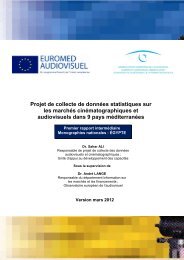
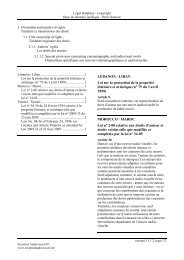
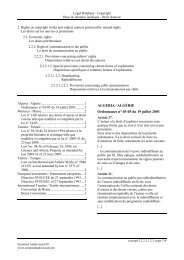
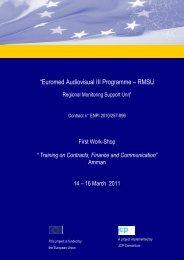
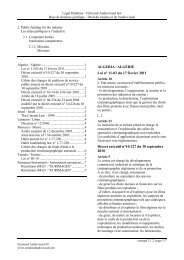
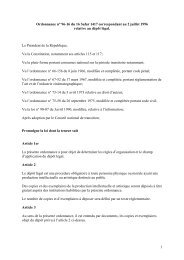
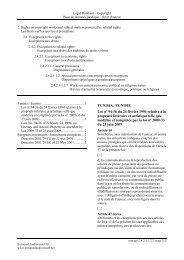
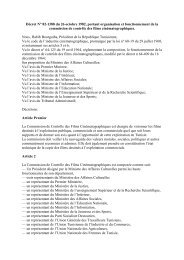
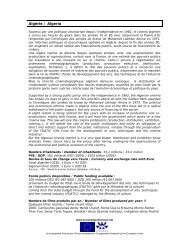

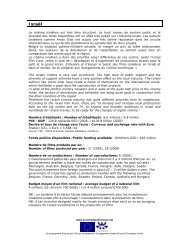
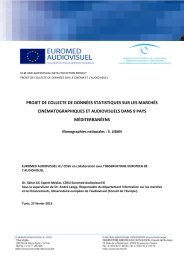
![Télécharger la brochure [fr/en] - Euromed Audiovisuel](https://img.yumpu.com/19570694/1/184x260/telecharger-la-brochure-fr-en-euromed-audiovisuel.jpg?quality=85)
